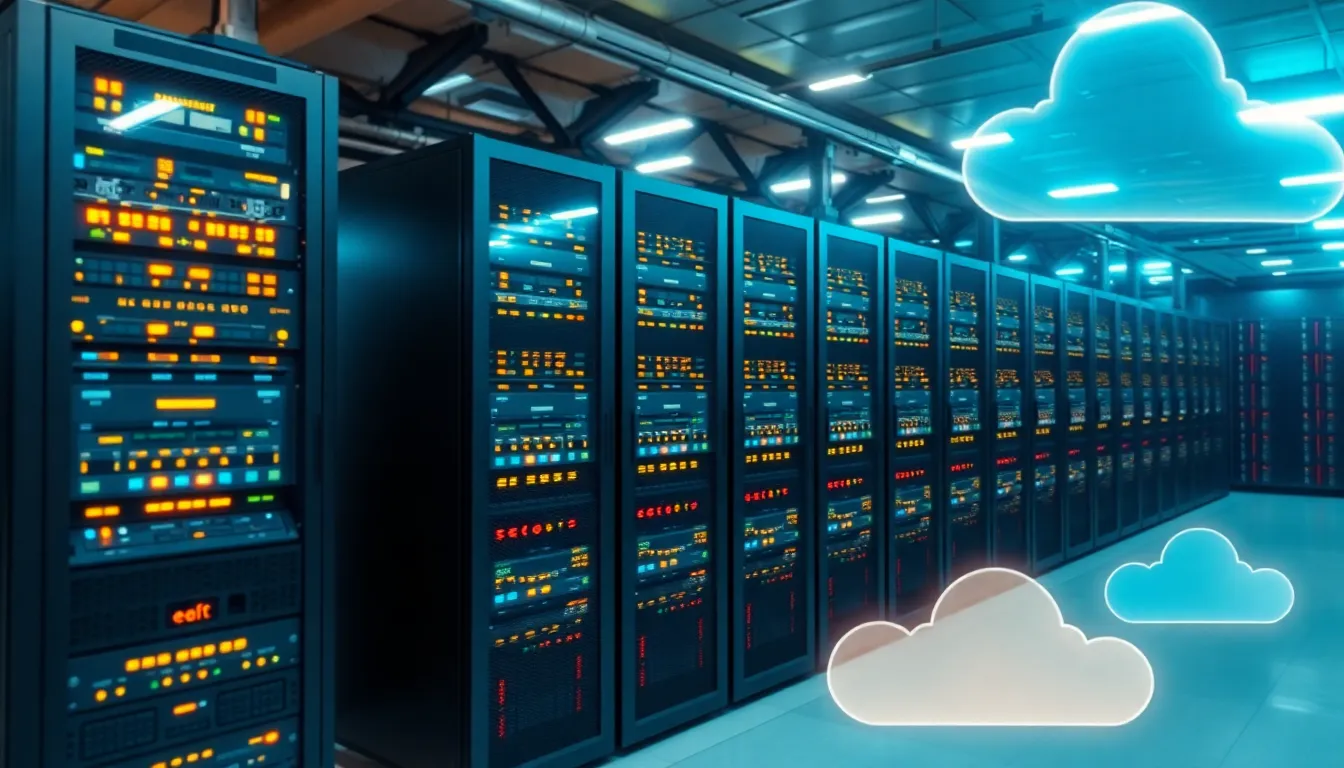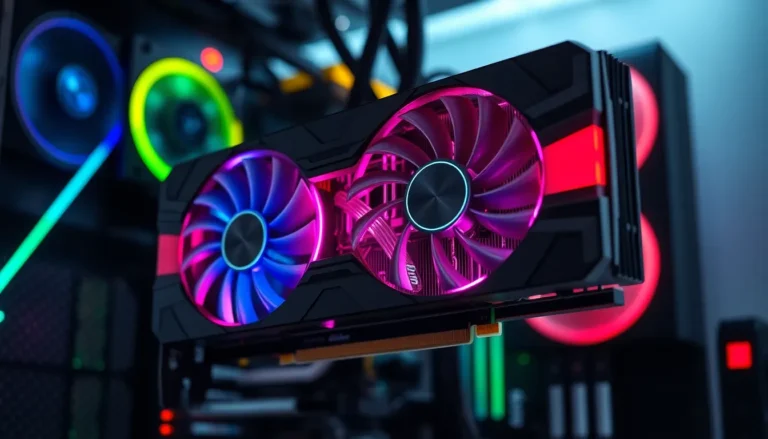Table of Contents
ToggleIn today’s fast-paced tech landscape, advanced hardware solutions are transforming industries and driving innovation. From powerful processors to cutting-edge storage systems, these solutions empower businesses to optimize performance and achieve unprecedented efficiency. As organizations strive to stay competitive, understanding the latest advancements in hardware becomes essential.
The rise of artificial intelligence, machine learning, and data analytics has intensified the demand for robust hardware. Companies are now leveraging specialized components designed to handle complex computations and vast amounts of data. This article delves into the key trends and technologies shaping the future of hardware solutions, highlighting their potential to revolutionize operations and enhance productivity across various sectors.
Overview of Advanced Hardware Solutions
Advanced hardware solutions encompass a range of technologies designed to elevate performance and efficiency in computing environments. These solutions focus on specialized components such as Graphics Processing Units (GPUs), Field-Programmable Gate Arrays (FPGAs), and Application-Specific Integrated Circuits (ASICs).
Prominent trends in advanced hardware solutions include:
- Edge Computing: Processing data closer to the source reduces latency, enhances real-time analytics, and minimizes bandwidth usage.
- Quantum Computing: Utilizes quantum bits for faster data processing and complex problem-solving, revolutionizing industries such as cryptography and pharmaceuticals.
- High-Performance Computing (HPC): Combines thousands of processors to tackle massive datasets, enabling significant advancements in scientific research and simulations.
- Artificial Intelligence (AI) Hardware: Incorporates specialized processors to accelerate machine learning tasks, fostering quicker decision-making and improved user experiences.
These technologies fulfill the increasing demand for computational power across sectors like healthcare, finance, and manufacturing. By implementing advanced hardware solutions, organizations achieve optimized workflows and enhanced operational capabilities.
Types of Advanced Hardware Solutions

Advanced hardware solutions encompass various technologies that enhance computational capabilities and efficiency. Key types include high-performance computing and cloud computing hardware.
High-Performance Computing
High-performance computing (HPC) leverages powerful hardware to process vast amounts of data quickly and accurately. This technology involves clusters of interconnected computers, often utilizing multiple processors and high-speed networks. HPC supports complex simulations and modeling across disciplines such as astrophysics, climate research, and molecular biology. Organizations harness HPC to achieve breakthroughs that standard computing cannot address, ensuring rapid results in scientific analysis and data-intensive tasks. For instance, supercomputers like the Fugaku in Japan achieve speeds surpassing 442 petaflops, underscoring the immense capabilities of HPC systems.
Cloud Computing Hardware
Cloud computing hardware enables scalable and flexible computing resources accessible via the internet. Businesses use this infrastructure, which includes powerful servers, storage systems, and networking components, to support a wide range of applications. Cloud service providers like Amazon Web Services (AWS) and Microsoft Azure offer extensive solutions that facilitate data storage, processing power, and high availability. Enterprises benefit from the cost-effectiveness and ease of deployment that cloud computing hardware provides. For example, AWS’s EC2 instances allow users to tailor computing resources based on demand, promoting efficient resource allocation and reducing hardware investment.
Benefits of Implementing Advanced Hardware Solutions
Implementing advanced hardware solutions offers significant advantages, enhancing operational capabilities and driving industry innovation. Key benefits include increased efficiency and cost-effectiveness, vital for modern businesses.
Increased Efficiency
Increased efficiency occurs through improved processing power and optimized performance. Advanced hardware components like GPUs and FPGAs enable faster data analysis and computation, reducing task completion times. Businesses experience streamlined workflows that enhance productivity. Enhanced processing capabilities allow for real-time data processing, facilitating quick decision-making. As a result, industries benefit from higher output levels, driving competitive advantage.
Cost-Effectiveness
Cost-effectiveness becomes apparent through resource optimization and reduced operational costs. Advanced hardware solutions minimize the need for extensive infrastructure by providing scalable resources that adjust to demand. Cloud computing platforms, such as AWS and Microsoft Azure, allow businesses to pay only for what they use, eliminating unnecessary expenses. Additionally, energy-efficient hardware lowers power consumption, further decreasing operational costs. By investing in advanced hardware, companies achieve a favorable return on investment, driving long-term financial benefits.
Challenges in Adopting Advanced Hardware Solutions
Adopting advanced hardware solutions presents several challenges that companies face when integrating new technologies into their existing systems. These challenges must be understood and addressed for successful implementation.
Integration Issues
Integration issues arise when new hardware systems must work alongside existing technologies. Compatibility with legacy systems poses considerable risks, as older systems may not support modern hardware capabilities. Custom coding or middleware solutions often become necessary, adding complexity and time to implementation processes. Additionally, varying data formats across platforms can lead to inefficiencies, requiring conversion protocols that complicate workflows. Ensuring seamless communication between new and existing systems is vital for maintaining productivity.
Maintenance and Upkeep
Maintenance and upkeep of advanced hardware solutions require substantial resources and expertise. Specialized knowledge is critical, as many advanced systems involve proprietary technology that necessitates ongoing training for IT staff. Regular updates and patches ensure optimal performance and security; however, these updates may require system downtimes that disrupt operations. Additionally, maintenance costs can accumulate, especially with high-performance computing systems, where unexpected hardware failures can lead to significant expenses and decreased operational capabilities. Companies must allocate resources for both immediate and long-term maintenance needs.
Future Trends in Advanced Hardware Solutions
Innovations in hardware solutions continue to shape various industries, leading to several future trends that will define the technological landscape.
AI Optimization
AI optimization emphasizes utilizing advanced hardware, such as dedicated AI chips, designed specifically for neural network processing. These chips enhance training speeds and improve inference performance, making AI applications faster and more efficient. Instances of AI optimization include Nvidia’s Tensor Core GPUs and Google’s TPU, which are already setting benchmarks in deep learning tasks.
Edge Computing Expansion
Edge computing will experience significant growth as the demand for real-time data processing increases. Devices at the edge will handle computations closer to data sources, minimizing latency and enhancing responsiveness. This expansion not only improves user experiences but also reduces bandwidth usage, as seen in applications like smart vehicle systems and IoT device networks.
Quantum Computing Developments
Quantum computing will advance, with investments increasing in research and infrastructure. Organizations like IBM and Google continue to progress towards practical quantum applications that can tackle complex problems unattainable by classical computers. The expected growth of quantum hardware will lead to breakthroughs in cryptography, materials science, and complex simulations.
Increased Integration of FPGA and ASIC Solutions
The integration of FPGA (Field-Programmable Gate Arrays) and ASIC (Application-Specific Integrated Circuits) solutions will grow as businesses seek customizable and efficient processing capabilities. These specialized hardware components provide flexibility and enhanced performance for applications requiring specialized computations, such as telecommunications and data centers.
Sustainability in Hardware Design
Sustainability will increasingly influence hardware design and production. Emphasis on energy-efficient components and sustainable manufacturing processes will lead to reduced environmental impact. Innovations in materials, such as biodegradable plastics for circuit boards, represent a trend toward a greener computing ecosystem.
Rise of 5G and Beyond
The rollout of 5G technology will enable faster data transmission and provide the infrastructure necessary for advanced hardware solutions. This will drive innovation in various sectors, including healthcare, where remote surgeries and telehealth services can benefit from enhanced connectivity. The implications of 5G extend to automotive, where connected vehicles will leverage real-time data processing capabilities.
Remote Work Enablement
Remote work demands efficient hardware solutions that support collaboration and productivity from anywhere. Advanced hardware for cloud-based systems and enhanced cybersecurity measures will become crucial for organizations shifting to hybrid work models. Companies must invest in robust hardware to secure data transmission and enhance employee experiences, as seen in platforms like Microsoft Teams and Zoom.
These trends highlight the ongoing evolution of advanced hardware solutions, driven by technological advancements and shifting industry needs.
Advanced hardware solutions are reshaping the landscape of various industries by enhancing performance and efficiency. As companies increasingly rely on cutting-edge technologies like GPUs, FPGAs, and ASICs, the ability to process data rapidly and accurately is becoming essential. The ongoing trends in AI, edge computing, and quantum computing promise to drive further innovation and operational improvements.
While the adoption of these advanced systems presents challenges, such as integration and maintenance, the benefits far outweigh the drawbacks. By investing in these technologies, organizations can streamline workflows, reduce costs, and gain a competitive edge in their respective markets. Embracing advanced hardware solutions is not just a trend; it’s a strategic move towards future-proofing businesses in an ever-evolving digital landscape.




